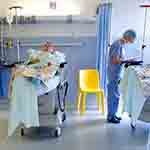 Increasing evidence suggests that taxes on soft drinks, sugar, and snacks can change diets and improve health, Sirpa Sarlio-Lähteenkorva argues in The BMJ today. Arguing in favour of a sugar tax, Sarlio-Lähteenkorva says that a tax of about €1 (£0.70; $1.10) on a kilogram of sugar would “substantially reduce demand for sugar and sweets and bakery products, with a slight increase in demand for meat.” She said this sugar tax would reduce body weight by an average 3.2 kg and the incidence of type 2 diabetes by 13%.
Increasing evidence suggests that taxes on soft drinks, sugar, and snacks can change diets and improve health, Sirpa Sarlio-Lähteenkorva argues in The BMJ today. Arguing in favour of a sugar tax, Sarlio-Lähteenkorva says that a tax of about €1 (£0.70; $1.10) on a kilogram of sugar would “substantially reduce demand for sugar and sweets and bakery products, with a slight increase in demand for meat.” She said this sugar tax would reduce body weight by an average 3.2 kg and the incidence of type 2 diabetes by 13%.
- Taking the opposite view, Jack Winkler argues that taxation is a negative approach, “punishing the bad rather than rewarding the good.” He says that there are more positive options, such as cutting product margins on soft drinks to ensure that sugar free drinks are cheaper. “Nutrition policy needs price instruments, but a more positive selection. Sugar taxes are unlikely to be adopted and would not make much difference if they were,” Winkler says.
 Elsewhere, John Appleby writes that the rising proportion of operations carried out as day cases over the past few decades has been “good for patients and a much more efficient use of NHS resources.” Appleby says that following the creation of a Department of Health task force on day surgery, along with £15m (€21m; $23m) of capital funds to expand the number of dedicated day surgery units, almost all trusts have at least one unit. He argues that if the move to more day cases hadn’t been made the cost to the NHS would have been far greater. In fact, by treating more patients as day cases, “the NHS had in effect saved around £2bn by 2013,” he says.
Elsewhere, John Appleby writes that the rising proportion of operations carried out as day cases over the past few decades has been “good for patients and a much more efficient use of NHS resources.” Appleby says that following the creation of a Department of Health task force on day surgery, along with £15m (€21m; $23m) of capital funds to expand the number of dedicated day surgery units, almost all trusts have at least one unit. He argues that if the move to more day cases hadn’t been made the cost to the NHS would have been far greater. In fact, by treating more patients as day cases, “the NHS had in effect saved around £2bn by 2013,” he says.
- In BMJ Confidential, Pankaj Sharma, professor of neurology at Royal Holloway and consultant neurologist, reveals his guilty pleasure is playing polo, which he describes as “thrilling, yet dangerous.” Sharma says that it was a comment by UK neurology professor, telling him that he would “never have a career in British neurology” that spurred him on to pursue the specialty. “The choice was made for me: neurology it was, and I’ve never looked back,” he says.
- Mark Newbold, professor of health leadership, has written an editorial in response to the recent debate around seven day services and hospital doctors’ contracts. Newbold argues that when Jeremy Hunt said in his speech at the King’s Fund that the BMA was “not remotely in touch with what [its] members actually believe”; he clearly thought that some doctors would support his proposals. Doctors would be better off addressing its frustrations with the workings of the health service “from the inside,” Newbold says, “as leaders, rather than from the outside, as critics.” He adds, “Whether doctors win or lose this [contract] battle we will surely lose the war unless our positioning, and perceived positioning, in this critical debate about the future of the health service changes.”
Abi Rimmer is deputy editor, BMJ Careers.
